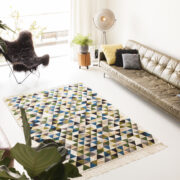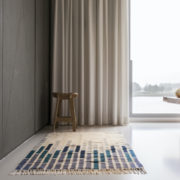
Photo: Creative Tunisia
Needless to say that 2020 was a special year. Looking back, we can conclude that the world was not easy and it should come as no surprise that it was not a happy year for Fair Fabrics. Despite the interior industry and Fair Fabrics doing relatively well in this crazy year, our biggest concerns were mainly behind the scenes. At our producers in the various countries there were complete lockdowns, which meant that all workshops had to be closed. Because in addition to all international customers, all income from the local, often tourist market, also disappeared.
“It is precisely under these circumstances that our impact is greatest and therefore extra important.”
Fair Fabrics was forced to take a break in the spring, because there was no production, but also no transport. As soon as was possible again, we put our shoulders to the wheel by 200% and made every effort to restart the chain carefully. We are impressed by the resilience of our workshops in the different countries and thank our patient customers too!
We prefer to focus on the positive and inspiring examples around us, where we would like to tell about Naima’s weaving workshop at the end of this year.

Niama and Karin Kandt from Fair Fabrics Photo: Moncef Ben Rajeb
A few years ago, we first met Naima, at a craft fair in Tunisia’s capital, Tunis. There she distinguished herself with her patterns and use of color from many other professional workshops. Her distinct combinations and different designs prompted us to get to know her further and to hear more about her working method and her personal life.
Naima comes from northwestern Tunisia, where she has worked as a rug weaver for more than 20 years, together with a group of 25 women. The region distinguishes itself with its rugs primarily because of their double-sided technique, so all rugs can be used on both sides. In her own designs she searches for symmetry between shape, pattern and color and combines tradition with modernity. It is not necessarily about perfection, but designs that belong today, so that it appeals to as many people as possible.

Naima and her daughter Chayma
She learned the craft from her mother as a child. Once married and became a mother, she stopped making kilims to spend more time with the family. When the children had grown up, there was more time to pick up her profession and make it their own again. Her daughter Chayma is now also intensively connected to the weaving workshop, which is currently located in 2 different locations in the north-west Tunisia region. Together they work on improving the productions and on new designs.
After the recent growth and some prestigious design awards from last year, she has also been able to successfully apply for a support program. With this Naima has investment money available to continue growing and to develop new products, such as blankets and bedspreads. She also wants to use this money to purchase new materials and recently presented herself to potential new customers at a fair.

Daughter Chayma wins a prestigious design award
With the new possibilities she can also connect new professionals to her studio. In addition, it is an extra stimulus to familiarize a new generation with weaving art and technology. In this way, the craft is not lost with the current generation.

Photo: Creative Tunisia
In recent years, we have worked with Naima on various successful projects on behalf of and together with a number of Dutch customers. We are all happy with the cooperation and in this way help each other to grow in entrepreneurship.
“In 2020 Fair Fabrics was responsible for more than 6 months of work for the weaving workshop of Naima and her daughter.”

Photo: Creative Tunisia






















